|
|
|
Sort Order |
|
|
|
Items / Page
|
|
|
|
|
|
|
| Srl | Item |
| 1 |
ID:
129642
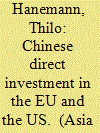

|
|
|
|
|
| Publication |
2014.
|
| Summary/Abstract |
Chinese outward foreign direct investment (OFDI) in developed economies has increased substantially in recent years, driven by policy liberalization and structural adjustments in China's economy. Efforts to accurately describe the dimensions of this increase are complicated by problems with official statistics and the complexity of deal structures. This article introduces the major problems of capturing data on global cross-border investment flows and elaborates on the particular difficulties of measuring Chinese outward FDI. It identifies alternative datasets that can help to better capture the scope and patterns of the Chinese overseas investment and uses one of them to describe the growth of Chinese investment in the EU and the US since 2000, highlighting similarities and differences in investment patterns in the world's two biggest economies.
|
|
|
|
|
|
|
|
|
|
|
|
|
|
|
|
| 2 |
ID:
133389
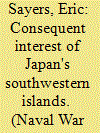

|
|
|
|
|
| Publication |
2014.
|
| Summary/Abstract |
In his classic collection of essays on maritime geography The Interest of America in Sea Power, Present and Future, Alfred Thayer Mahan opined that the importance of "portions of the earth's surface, and their consequent interest to mankind, differ from time to time."1 Just as the Mediterranean Sea once transfixed the minds of European strategists and policy makers, Mahan believed, at the turn of the twentieth century, the Gulf of Mexico and Caribbean Sea would obtain similar prominence in American strategic thinking. A century later, as we observe the relative balance of economic and military powers shifting to Asia and the Pacific and Indian Oceans, Mahan's teachings on geography are again instructive, as once seemingly insignificant bodies of water and island chains take on a new importance in regional security matters.
|
|
|
|
|
|
|
|
|
|
|
|
|
|
|
|
| 3 |
ID:
129644
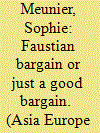

|
|
|
|
|
| Publication |
2014.
|
| Summary/Abstract |
This article explores the political challenges posed by the recent influx of Chinese outward foreign direct investment (OFDI) into the European Union (EU), which has become in 2011 the top destination for Chinese investment in the world. The central political question facing European states welcoming the influx of Chinese capital is whether this is a good bargain-a positive-sum game where both investor and investee benefit-or instead a Faustian bargain-a zero-sum game in the long term where capital is accompanied by implicit conditionality affecting European norms and policies, from human rights to labor laws. The novelty of Chinese FDI has the potential to affect politics in Europe in three different venues: inside European countries, between European countries, and between Europe and third countries. This article, whose main goal is to launch a research agenda on the political implications of Chinese FDI, explores in turn its potential impact on foreign and domestic policy, institutional process within the EU, and transatlantic relations
|
|
|
|
|
|
|
|
|
|
|
|
|
|
|
|
| 4 |
ID:
124763
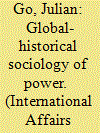

|
|
|
|
|
| Publication |
2013.
|
| Summary/Abstract |
Michael Mann's long-anticipated volumes, the sources of social power, volume 3: global empires and revolution, 1890-1945 and the sources of social power, volume 4: globalizations, 1945-2011 complete Mann's career-spanning project. Compared to previous volumes in the series, these works are much more global in scope. They address topics such as global wars, empires, social citizenship across the industrialized world, economic recessions and climate change. In this way they rectify omissions in Mann's previous work, even while continuing to deploy Mann's previous IEMP (ideological, economic, social, political) model of power. However, three shortcomings remain: first, the books do not adequately deploy the concept of society as power networks; second, they do not offer a conceptualization of global systems or dynamics beyond the sum total of actions by individual states or actors; and third, they retain the standpoint of power in their analyses. Despite these shortcomings, these volumes offer a masterful global history of power over the past century and a half and make long-lasting contributions to the historical sociology of power.
|
|
|
|
|
|
|
|
|
|
|
|
|
|
|
|
| 5 |
ID:
090970


|
|
|
|
|
| Publication |
2009.
|
| Summary/Abstract |
Given the rise of major economic powers in the Asia-Pacific that rely on energy imports to sustain their economic growth, the Indian Ocean region has assumed a new importance. Various powers are once again vying for the control of the waves in this part of the world. This article examines the emerging Indian approach towards the Indian Ocean in the context of India's rise as a major regional and global actor. It argues that though India has historically viewed the Indian Ocean region as one in which it would like to establish its own predominance, its limited material capabilities have constrained its options. With the expansion, however, of India's economic and military capabilities, the country's ambitions vis-à-vis this region are soaring once again. India is also trying its best to respond to the challenge that growing Chinese capabilities in the Indian Ocean are posing to the region and beyond. Yet, preponderance in the Indian Ocean region, though much desired by the Indian strategic elites, remains an unrealistic aspiration for India given the significant stakes that other major powers have in the region.
|
|
|
|
|
|
|
|
|
|
|
|
|
|
|
|
| 6 |
ID:
124129
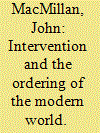

|
|
|
|
|
| Publication |
2013.
|
| Summary/Abstract |
This introductory discussion establishes the notion of intervention as a 'social practice' and carves out the contextual and conceptual space for the Special Issue as a whole. The first move is to recontextualise intervention in terms of 'modernity' as distinct from the sovereign states system. This shift enables a better appreciation of the dynamic and evolutionary context that generates variation in the practice of intervention over time and space and which is analytically sensitive to the economic and cultural (as well as Great Power) hierarchies that generate rationales for intervention. The second move is to reconceptualise intervention as a specific modality of coercion relatively well-suited to the regulation or mediation of conflict between territorially bounded political communities and transnational social forces. Third is to 'historicise' the practice of intervention through showing how it has changed in relation to a range of international orders that have defined the modern world and which are each characterised by a different notion of the relationship between social and territorial space. Fourth and finally is a brief consideration of the possibility of intervention's demise as a social practice.
|
|
|
|
|
|
|
|
|
|
|
|
|
|
|
|
| 7 |
ID:
124722
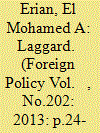

|
|
|
|
|
| Publication |
2013.
|
| Summary/Abstract |
AS THE WORLD'S power brokers--well, ministers and central bankers from 188 countries--gather in October for the annual meetings of the International Monetary Fund, they will again be confronted by evidence that the IMF is still in need of proper reform. This time, the evidence comes not only in the form of continued global economic malaise and financial instability, but the IMF'S brutally honest self-evaluation of its role in the insufficient Greek bailout (and, by implication, its involvement in other European countries). On the heels of this disappointing performance, one thing is clear: The IMF is still stuck in the last century
|
|
|
|
|
|
|
|
|
|
|
|
|
|
|
|
| 8 |
ID:
131496


|
|
|
|
|
| Publication |
2014.
|
| Summary/Abstract |
International organizations (IOs) suffuse world politics, but the International Monetary Fund (IMF) stands out as an unusually important IO. My research suggests that IMF lending is systematically biased. Preferential treatment is largely driven by the degree of similarity between beliefs held by IMF officials and key economic policy-makers in the borrowing country. This article describes the IMF's ideational culture as "neoliberal," and assumes it to be stable during the observation window (1980-2000). The beliefs of top economic policy-makers in borrowing countries, however, vary in terms of their distance from IMF officials' beliefs. When fellow neoliberals control the top economic policy posts the distance between the means of the policy team's beliefs and the IMF narrows; consequently, IMF loans become less onerous, more generous, and less rigorously enforced. I gathered data on the number of conditions and the relative size of loans for 486 programs in the years between 1980 and 2000. I collected data on waivers, which allow countries that have missed binding conditions to continue to access funds, as an indicator for enforcement. I rely on indirect indicators, gleaned from a new data set that contains biographical details of more than 2,000 policy-makers in ninety developing countries, to construct a measure of the proportion of the top policy officials that are fellow neoliberals. The evidence from a battery of statistical tests reveals that as the proportion of neoliberals in the borrowing government increases, IMF deals get comparatively sweeter.
|
|
|
|
|
|
|
|
|
|
|
|
|
|
|
|
|
|
|
|
|